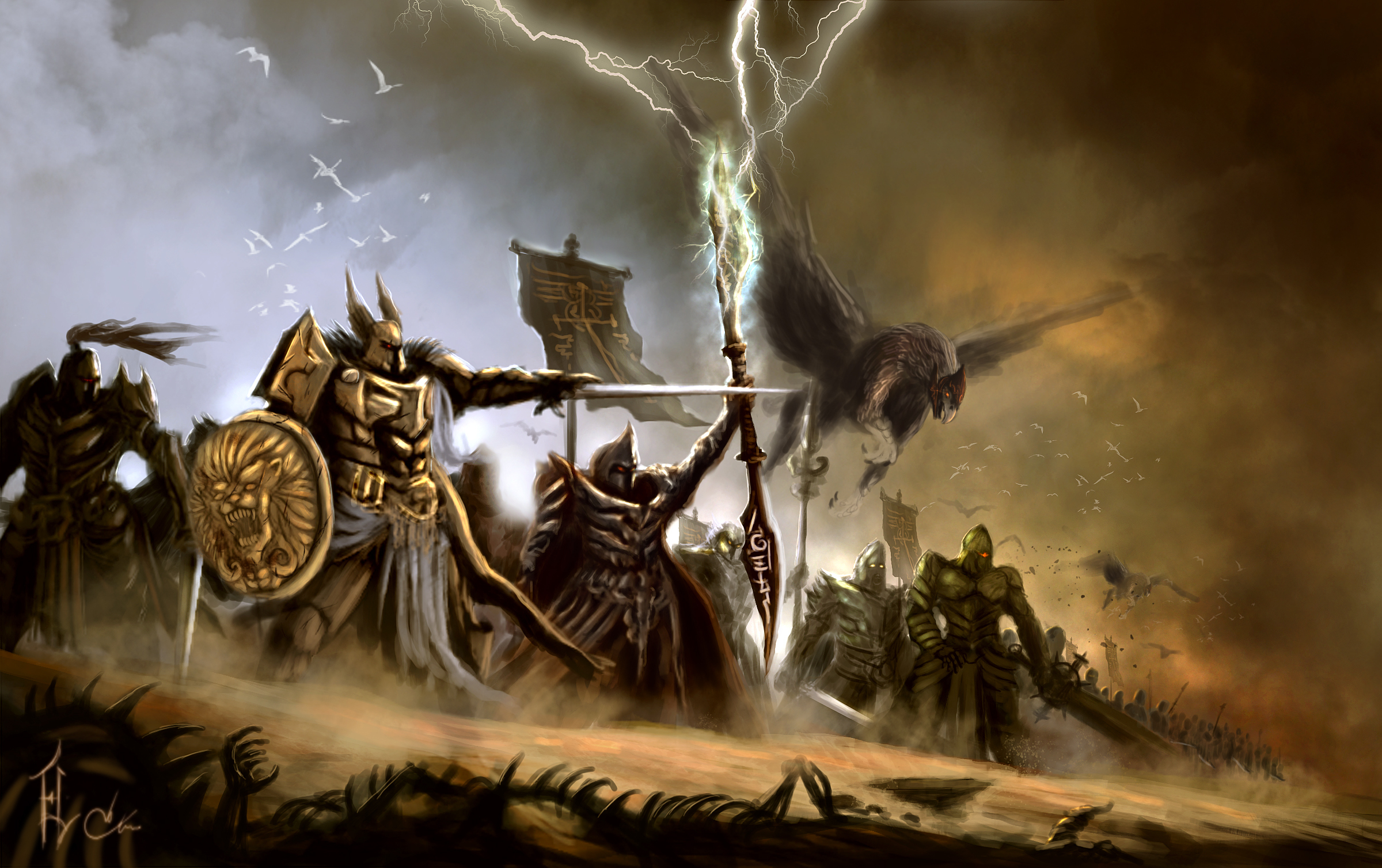 Congratulations! You and your comrades have overthrown the Evil Overlord and liberated the land from his tyrannical grip; now all citizens are free once more to live their lives as they choose, within the new laws & policies being laid down by the Republic, i.e. you and your comrades.
Congratulations! You and your comrades have overthrown the Evil Overlord and liberated the land from his tyrannical grip; now all citizens are free once more to live their lives as they choose, within the new laws & policies being laid down by the Republic, i.e. you and your comrades.This is a short game about what happens after the heroes win in an epic fantasy story: the Big
Bad Evil is dead, but now who gets to run the country? Well, to begin with, the heroes do! As the committee of the new Republic, they (that is, you) have to determine the way ahead for the newly liberated people of the old Evil Empire.
You'll need 4-6 players for this game: it can work with more, but it will run very slowly and some players will have a long wait before they get a chance to speak. Each player takes on the role of an archetypal fantasy hero from the following list, which describes their political outlook:
The Barbarian: believes in strength of arms, that the best defence is a good offence and that laws must be enforced by the state.
The Bard: the great negotiator, who would always rather talk than fight and looks for the common ground in all situations, often appealing to their opponent's own personal desires.
The Cleric: representative of a benevolent and merciful God, they only approve of what their God wants and seek to convert all to their beliefs.
The Druid: an Earth-First environmentalist who will oppose anything that is harmful to the ecological balance and support anything that favours the welfare of wild flora & fauna.
The Monk: the pacifist who seeks balance & moderation in all things but abhors the use of violence or coercion in any form.
The Paladin: their first priority is to deal with surviving supporters of the old regime and eliminate them; they must be flushed out, hunted down and executed!
The Ranger: the pragmatic survivalist, only concerned with the short-term needs of the state as it is, responding to situations as they arise, not worrying about the future.
The Thief: an underhanded sneak who favours the stance 'Apology is Policy', believing it is better to do what needs doing covertly, by any means necessary.
The Sorcerer: a staunch opponent of restrictive rules and state intervention in private affairs, they believe that everyone should be free to do what they want in a free-market.
The Wizard: will go with whatever the facts support, a rationalist who analyses each situation to see what is the best course of action to achieve long-term benefits.
You can add more characters to this list if you have need of them, as long as each one adopts a distinctive stance in discussions and isn't simply a re-iteration of an existing role. Once everyone has selected a character, take the time to go around the table and allow everyone to introduce their role in-character: it is recommended that you also use name badges or name plaques for each character (I usually fold a piece of paper to make a tent, writing the character's identity on the side facing out to the other players.)
The game itself deals with the committee debating the best way forward for the nation as a whole and there are a number of urgent issues to be dealt with. Starting from the oldest player and taking it in turn, everyone gets to pick an issue from the list below, or make up their own fantasy-appropriate issue, and propose a policy for tackling some aspect of that issue.
Foreign Diplomacy: just before the heroes killed the Evil Overlord, the neighbouring lands were poised to declare war on the Evil Empire and that situation hasn't greatly changed. How will the Republic deal with their neighbours, who have reasons to bear grudges against the lands of the Evil Overlord?
 Population Implosion: without the support of the Evil Overlord's demonic minions, the infrastructure of the Republic is under enormous pressure; many thousands of citizens died under the regime and thousands more fled to seek refuge in neighbouring lands. How can the Republic re-build without the workforce available to do so?
Population Implosion: without the support of the Evil Overlord's demonic minions, the infrastructure of the Republic is under enormous pressure; many thousands of citizens died under the regime and thousands more fled to seek refuge in neighbouring lands. How can the Republic re-build without the workforce available to do so?Equal Rights: the races of dwarves and elves were hard-pressed under the Evil Overlord's tyranny, with the dwarves forced to mine & smith for the Evil Empire, while the elves were systematically purged from their ancestral homelands. How can this be put right by the Republic?
Contraband: under the Evil Overlord, the creation and possession of magic potions and items was strictly prohibited; now is a chance to undo those strictures, if the committee feels they should be. Perhaps this was the one sensible policy the Evil Overlord instituted?
Taxation: all of the improvements and changes the Republic plans will cost money; the Evil Overlord just took what he wanted from those who had it, but the Republic needs to persuade it's citizens to part with their earnings willingly. What should be taxed? By how much?
Justice: the legal system collapsed under the Evil Overlord, as his word was law; now there are many civil suits that need deciding, not to mention the criminal justice system that has to be rebuilt. What crimes should be pursued most urgently and what should the punishment be?
Each issue can be tackled more than once, as long as it is a distinctly different policy being put up for debate each time: avoid re-hashing things that have already been debated and voted on. When any player tackles an issue, they put forth the proposal for a specific policy related to that issue, keeping in mind their own political stance. The proposer of a policy gets no more than 2 minutes to speak in favour of it, using whatever strategies and reasoning they see fit.
For example, the Druid tackles the issue of Equal Rights and proposes a policy of reforestation to restore the ancestral homelands of the elves, thus giving them assurance that they are welcome within the borders of the Republic.
After proposing, the player then nominates their opponent: they indicate any other character who must speak against their proposal. The opponent must also stay true to their political motivations while opposing the proposal, so this might often require considerable mental gymnastics from the player concerned in order to align their character's stance with opposition to the suggested policy. The opponent, like the proposer, may take up to two minutes to make a persuasive argument for their case.
Continuing the example, the Druid nominates the Paladin as their opponent, so the Paladin argues against the policy of reforestation on the grounds that the forests provide a perfect place for the minions of the Evil Overlord to hide and plot against the Republic!
 Once the opponent completes their counter-argument, each other player may ask one question about the issue, directing it towards either the proposer or the opponent, but their opposite has the right-of-reply: no answer should take more than 1 minute. After every other player has had an opportunity to ask a question, take a vote: first, raise hands for "Aye!", in favour of the policy, then raise hands for "Nay!", against the policy, with characters being permitted to abstain. Simply count up the vote to see whether the policy is passed into practice or not, but a majority vote is needed to pass, so in a tie, the policy is not enacted.
Once the opponent completes their counter-argument, each other player may ask one question about the issue, directing it towards either the proposer or the opponent, but their opposite has the right-of-reply: no answer should take more than 1 minute. After every other player has had an opportunity to ask a question, take a vote: first, raise hands for "Aye!", in favour of the policy, then raise hands for "Nay!", against the policy, with characters being permitted to abstain. Simply count up the vote to see whether the policy is passed into practice or not, but a majority vote is needed to pass, so in a tie, the policy is not enacted.Everyone at the table should get the chance to be proposer at least once and ideally also to be the opponent at least once, though this latter may not always occur. The game ends when everybody has made their proposals, at which point the committee may sit back and reflect on how they have guided and shaped the Republic: have they been an effective force for good or not?

No comments:
Post a Comment